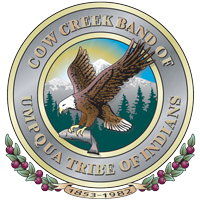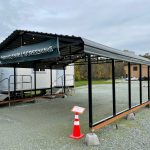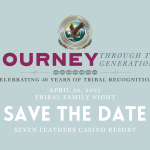Flying Lark Owner Seeks Partners to Avoid Layoffs
This article is also featured in the February edition of the Cow Creek Tribal Newsletter. Browse newsletter archives here (Tribal login required).
The billionaire coffee stand owner behind the Flying Lark in Grants Pass says he thinks Oregon’s Tribes could co-partner with him to sustain the horse racing track and entertainment facility.
Referring to himself and the project as a “bridge-builder” during a recent radio interview on Oregon Public Broadcasting, Dutch Bros. co-founder Travis Boersma said he’s not against working with Tribes to get the Flying Lark to succeed.
“This has never been about money…This is about impact for community,” Boersma said in the January 14 interview. “I think Tribes actually could benefit by this. I think there could be a deal to be had to where they could own, invest, be a part of it. This is something that could actually give them more market share.”
Umpqua Indian Development Corporation’s President, John McCafferty, disagrees, arguing that the Flying Lark would divert patrons away from Seven Feathers Casino Resort and other casinos, resulting in an estimated initial loss of $20 million.
“All he’s doing is entering a market that’s already being served,” said McCafferty. “If we partner with him, we won’t make up that loss. All you’re going to be doing is cannibalizing the gaming business that already exists.”
The contention behind the Flying Lark hinges on historic horse racing machines (HHRs) that Boersma wants to install on site at the track, and whether the state will allow those types of betting terminals. Oregon’s Tribes, including Cow Creek, argue HHRs at the Flying Lark amount to a private casino, violating an agreement with the State of Oregon and would disrupt crucial revenue streams into Tribal Governments and the Oregon Lottery, both of which support programs that uplift communities in need.
Tribal leaders hope either Oregon Governor Kate Brown weighs in on the matter, or that Oregon’s legislature takes up a bill in the coming weeks to pause all gaming expansion in the state in order to study its true impact on local economies. McCafferty believes a comprehensive study will reveal that there are issues that need to be dealt with in Oregon’s gaming industry besides just finances.
“The economic impact is really important. But the security and the integrity of the gaming landscape is even more important,“ said McCafferty. “All those things need to be regulated at the same level and that’s not happening today. There’s no one agency that oversees it all.”
Boersma also recently announced that due to the delay over HHRs, he would be forced to lay off more than 200 people at the Flying Lark at the end of February.
“It’s heartbreaking,” he said, recalling telling the news to his employees. “A lot of these people are second chance people, veterans, people that are very diverse. We have the second largest unemployment rate in Josephine County.”
“What do you say to the people in Douglas County who are working for the Tribe and lose their jobs because a billionaire came in?” said McCafferty. “He went ahead with this project and turned the speed up knowing there was an issue. He did it anyway.”
Boersma was also asked to comment directly on testimony from Cow Creek Gaming and Regulatory Commission Executive Director Alicia McAuley spoken back in October to the Oregon Racing Commission as they discussed the Flying Lark’s HHR application.
“The market in Oregon is already saturated,” McAuley told the Oregon Racing Commission at the time. “The Flying Lark will not attract new gamblers, it will take from the Lottery retailers and patrons of Tribal casinos. Any jobs created will come at the expense of other jobs and ultimately other local business and they won’t be new. Revenues won’t be a net benefit for the state, they will be a net loss, and only a benefit for the operator and owner of the Flying Lark.“
When asked for his response, Boersma replied that he heard “a lot of inaccuracies,” and that the HHR machines he’s seeking install are the same as those that were at Portland Meadows.
“The only difference is it’s the iPhone 13 to the iPhone 5,” he said.





